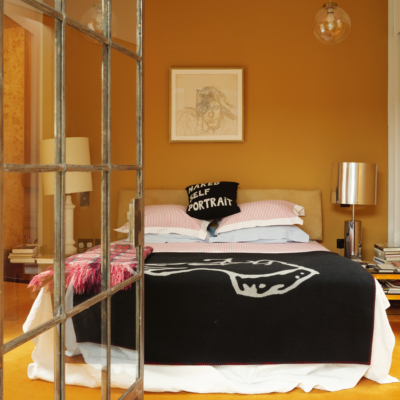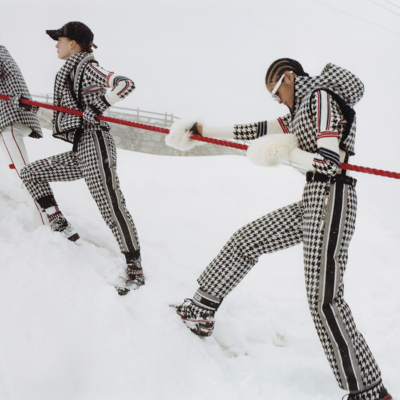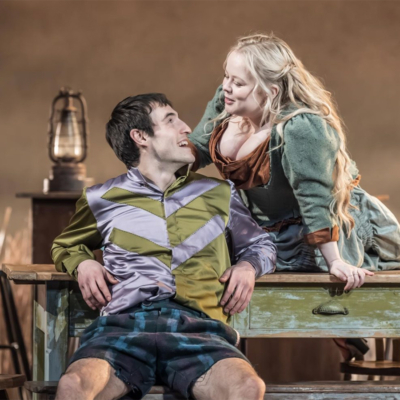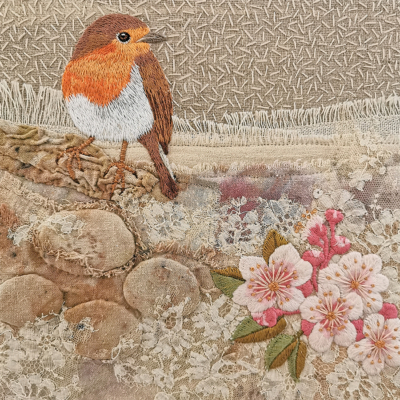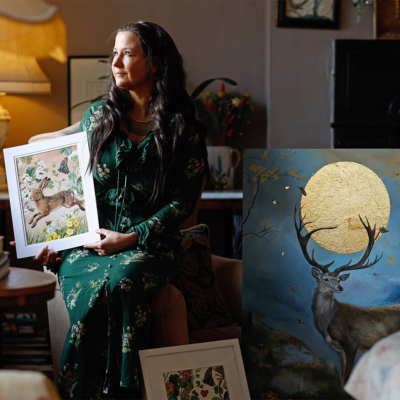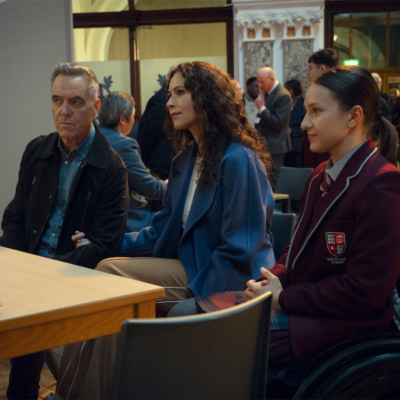What was it about The Country Girls that so sorely provoked the authorities? Banned by the Irish censor upon its publication in 1960, branded a “smear on Irish womanhood” by the Archbishop and burned by a priest, Edna O’Brien’s debut novel thrust her into the extremes of literary persecution. Sixty years since its publication the coming of age story of Cait and Baba is still as dewy fresh and surprising. Though modern readers might be disappointed if they were hoping to be shocked.
Enjoying the book now, it’s not obvious what all the fuss was about. Aside from maybe, allusion to lesbian awakenings in the elm grove, mention of a nun “getting friendly” with a gardener, and the “dirty note” that results in the girls’ expulsion from boarding school. It seems it was more a question of what O’Brien’s book suggested might happen that what actually did. It’s here lies her great skill as a writer and chronicler; and as Andrew O’Hagan has described her, “a master withholder”.
The real scandal is surely an abusive father, a workman looking for a kiss from a 14 year old and of course, Mr Gentleman’s untimely seduction. The Country Girls is so much more about grief, abandonment and the slow-dawning disillusionment of growing up than it is a work of smut. It was not, like Lady Chatterly’s Lover, a book that young ladies in the 1960s covered with another book if they wanted to read it on, say, a train (as this writer’s mother did).
Having eloped and moved to London, Edna O’Brien sat down to write her first novel in some Aisling jotters, writing furiously every day after she dropped her young boys to school. With her advance of fifty pounds, it took her three weeks, and cost her many tears to produce – though “they were good tears” as she later wrote in her memoir Country Girl.
“The words poured out of me and the pen above the paper was not moving fast enough so that I sometimes feared they would be lost forever…It had written itself and I was merely the messenger”.
O’Brien knew that her mother would disapprove – the portrayal of the hero’s mother is not kind – but could never have imagined that she would disown her. Having heard about her book, her mother wrote to her saying she “hoped and prayed that I was not going to bring ignominy and disgrace on my own people”.
What they feel at the moment they are reading it is the only important thing
After her mother’s death she found the book with offending passages struck out with black pen, while others in her small County Clare village heaped scorn on her family. “The postmistress…told my father that a fitting punishment would be for me to be kicked naked through the town”.
Persecution doesn’t just happen a person once, it builds up as accusation follows accusation, shaming begets shaming. When the first royalties cheque came in O’Brien had to endorse it then hand it to her husband Ernest Gebler, receiving only a small amount from it each week for housekeeping. In the court battle she fought to get custody of her two children her husband brought her novels as evidence in the witness stand. A journalist in Ireland, male, wrote in Hibernia, quoting her husband, that her “talent resided in her knickers”.
The Country Girls was the first of O’Brien’s six novels which were banned in the 1960s, followed quickly with The Lonely Girl and Girls in their Married Bliss. In December 1966, aged 36, she walked through Dublin airport with just the jackets of the five novels she had written to that date. The books had been seized. “I just lost five pounds,” an indigent O’Brien told a reporter.
While one priest, Father Peter Connolly, a professor of English in Maynooth tried to champion her novels, the intellectual group An Tuarim held a special public meeting to voice their reservations about the young offender, who another (male) writer had by now dismissed as a “nymphomaniac”. And there was that infamous – if not entirely corroborated – burning of her books by a parish priest in a place called Tuamgraney.
Some 18 novels on, O’Brien is a figure of freedom and a redoubtable author, using her voice to drive home the appalling capture of girls by Boko Harem (Girl) and sexual violence (The Little Red Cars).
While being cross-examined by her community in Limerick, one of the questions she was asked was whether she put much of her life into her books. To which she reportedly replied, ‘I have always thought that people’s interest in this side of a book is vulgar and speculative. What they feel at the moment they are reading it is the only important thing.”
Banned in Ireland
Mary Lavelle and The Land of Spices by Kate O’Brien
Kate O’Brien was enjoying critical and popular acclaim until 1936 when her third novel, Mary Lavelle was labelled “indecent” by the Irish censor and taken out of commission. Four of her remaining six novels were then submitted to the Censorship Board and one, The Land of Spices, was banned. Regarded by many as her finest novel, it’s understood the banning came down to a single line alluding to Henry Archer’s homosexuality: “She saw her father and Etienne in the embrace of love.” The Land of Spices was later unbanned. As for Mary Lavelle, the Irish heroine’s love affair with her employers’ married son would not have been taken kindly to by the Irish Conservative thought police. [thank you Dr Jana Fischerova]
The Dark by John McGahern
In 1965 260 advance copies of The Dark were seized by Irish customs and excise officers. McGahern returned to Dublin to see the manager of the school where he taught. As McGahern told it, his words were: “What entered your head to write such a book? You caused a terrible shemozzle. I couldn’t take you back after that. There’d be an uproar.” McGahern, then 30, would never teach again, and it took him another four years to write. Following the ban, writers from Michael McLaverty to Samuel Beckett offered their support to McGahern, who remained silent through the controversy. “I didn’t think it was worth protesting about,” he said afterwards. “I didn’t want to dignify it.” The ban was lifted in 1972.
The Gingerman by JP Dunleavy
Published, like Lolita, in 1955, The Gingerman was banned in Ireland and the US, possibly for good reason. It had been, the author claimed, rejected by some 45 publishers. Archbishop John Charles McQuaid closed down the stage adaptation after three nights. The drinking and philandering and wife-mistreating antics of Sebastian Dangerfield would probably not be published today were anyone to write them now. Certainly the book is not flavour of the month for those brought up in MeToo times. But it has sold over 45 million copies and never gone out of print.
Borstal Boy by Brendan Behan
“Friday in the evening, the landlady shouted up the stairs: ‘Oh God, oh Jesus, oh Sacred Heart. Boy, there’s two gentlemen to see you.’” So begins Brendan Behan’s brilliant novel about his time in the borstal, banned after publication in 1958. Allusions to homosexual goings on in the prison, Sinn Fein support, and veiled bad language (“fughing hell”) might have determined the fate of this otherwise charmingly innocent book. Either way, it won, with a Tony Award winning stage adaptation and Behan’s description of banned authors as “the best banned in the land”.
The Tailor and Ansty by Eric Cross
The story goes that the Newry born writer bought a horse and caravan and settled in a place called Gougane Barra in Co Cork. He immersed himself in the local community, particularly the company of the local seanchai, tailor Tim Buckley and his wife Anastasia, who furnished his imagination with stories. These he recorded for a series of articles in The Bell which were made into a book, The Tailor and Ansty. Championed by Frank O’Connor, the book was banned by the Censorship Board for being “in its general tendency indecent”. It became the subject of a vicious four day long debate in the Senate. The Tailor and Ansty themselves were personally visited by clergy who asked the tailor to burn copies of the “filthy” book in their own fireplace. This was the first book to have its ban lifted and it was adapted for the Peacock stage in the 1968 Dublin Theatre Festival. (Thank you Pauric J. Dempsey and Bridget Hourican).
LOVETHEGLOSS.IE?
Sign up to our MAILING LIST now for a roundup of the latest fashion, beauty, interiors and entertaining news from THE GLOSS MAGAZINE’s daily dispatches.





